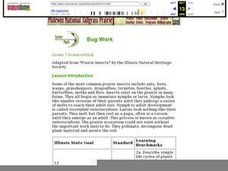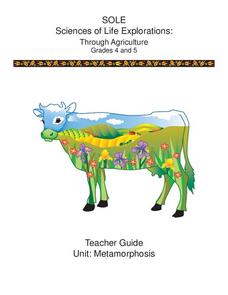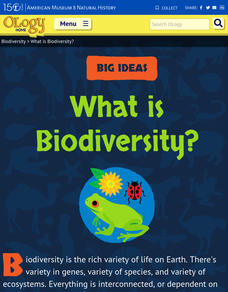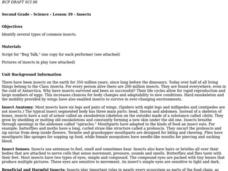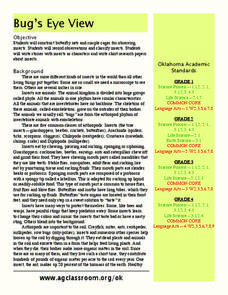Curated OER
Striking a Balance
Students participate in an activity that demonstrates the principles and dynamics of food chains. They discover that the sun's energy is captured by individual plants and transferred to animals.
Curated OER
Bug Work
Learners explore the life cycles of insects and how they interact with each other in the prairie to create a healthy ecosystem and viable food chain. They list animals or insects in their own community that are similar to the prairie...
Curated OER
Pyramid of Biomass
Students interpret data to demonstrate biomass and number pyramids. They use information to draw conclusions and examine an example of biological magnification.
Cornell University
Metamorphosis
Looking for an insect unit that addresses multiple skill strategies? Young entomologists explore multiple life cycles of insects that go through metamorphosis. The brainteasers and mobile activity spark learner interest before guiding...
Curated OER
Venus Flytrap
Learners study the Venus Flytrap including its habitat and how it eats. In this ecology lesson plan students complete several experiments using a Venus Flytrap to see how it reacts to various conditions.
Curated OER
Matter and Energy
In this matter and energy worksheet, students will complete 10 questions about the transfer of energy through a food chain, the steps of the water cycle, and how the nitrogen cycle works.
Curated OER
Wappo Indians: Animals They Hunted
Third graders examine the hunting and foraging practices of the Wappo tribe. They discover Wappo words for food and determine which animals still live in Napa County. They research the diet, habits and homes of these animals.
Curated OER
Peregrine Falcon
Young environmentalists study the effects that pesticides have on birds, such as the peregrine falcon. They also look at predator/prey interactions. Some wonderful in-class activities accompany an inventive lesson. After an activity that...
Curated OER
Bug's Eye View
Investigate the life of bugs and how they interact with the environment in this integrated science and language arts lesson. Young scientists construct mini environments in cages in order to make observations. This data forms the basis...
Calvin Crest Outdoor School
Survival
Equip young campers with important survival knowledge with a set of engaging lessons. Teammates work together to complete three outdoor activities, which include building a shelter, starting a campfire, and finding directions in the...
American Museum of Natural History
What is Biodiversity?
Not all dogs are the same just like not all finches are the same. An interactive online lesson helps individuals learn about the causes and limitations to biodiversity. The clickable sections describe the basics of the genetics of...
Curated OER
All About Seeds!
How do fruits relate to flowers and seeds? Identify the seeds and their purpose with a coloring activity for kindergartners. Once they color the seeds of apples, bananas, and peas (among others), kids get hands-on experience with bean...
Curated OER
Understanding Theme with Fables
What is the moral of the story? Ask your class to read a series of fables from which the last line has been removed. After supplying this concluding statement, they must justify their responses. This could be used as an individual or...
Curated OER
Name that animal
A great way to classify organisms, is by counting the number of legs it has or how it moves. Little ones count the legs on five different creatures, then match the leg count to the proper animal name. Tip: Have them come up with other...
Curated OER
Forecast Sunny and Warm
Students explore the concept of philanthropy. In this service learning lesson, students participate in hands-on activities that replicate building a foundation and providing for future generations.
Curated OER
Insects
Second graders brainstorm and identify several types of common insects. They play bug bingo, building bugs and an insect tree, observing real insects in the classroom and examining some of the things insects make.
Curated OER
Arthropod Coloring Worksheet
In this biology worksheet, learners color and label the different parts of arthropods. They complete 63 short answer and fill in the blank questions on arthropods.
Curated OER
The Greatest Show on Earth: The World's Smallest Animals
Students create instruments to capture different types of insects. In this The Greatest Show on Earth: The World's Smallest Animals lesson, students compare the attributes of certain insects and record the data on a chart. After catching...
Curated OER
Understanding Theme With Fables
For this theme worksheet, students read a set of short fables, determine theme and write their explanations below each.
Curated OER
What is an Insect?
Learners examine insects and identify physical characteristics of insects. They perform observations of insects, then use a worksheet imbedded in this plan to answer questions about them.
Curated OER
Spiders! Scary or Nice?
Students participate in a variety of cross-curriculur activities in order to explore spiders.
Curated OER
Bug's Eye View
Students explore biology by writing fictitious stories in class. In this insect life lesson, students identify many different types of insects in the animal kingdom and the classifications they fall into. Students collect insects on a...
Curated OER
Populations and Ecosystems
Sixth graders define terms prey, predator, and scavenger, describe predator-prey relationship, discuss effects of a lack of predators in an environment, and separate the role of the scavenger from that of the predator.
Curated OER
Introduction To Insect & Spider Body Parts
Students inspect several different specimens of insects and spiders to determine characteristics that are similar and different between the two groups. They identify the basic body structure of spiders and insects and then predict where...

